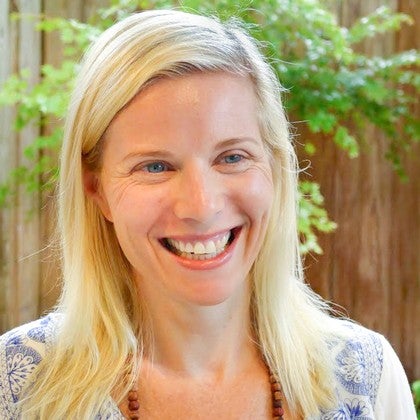
What Does a Yogi Eat?
I escaped it for a few years, the big conundrum yogis ponder: What is the right food to eat? Once I was teaching and found myself committed to a life of yoga, I’ll be the first to admit that I embodied the rather dangerous combination of being both naïve and impressionable. I was easily caught in the tornado of dietary advice that swirls around the yoga lifestyle. At one point, in order to “mimic” the livelihood of plant life, I ingested only clay, water, and wheatgrass for weeks. My skin glowed; my once-tight yoga pants became baggy. It was challenging and appealed to my curious nature. From diets such as this, I hoped to find clarity, truth, and vitality. And I was able to accomplish this...I think...temporarily.
The diets all seemed to have a honeymoon phase where I felt radiant and alive, but that faded. Having such an out-standing diet left me feeling ostracized at times, sequestered. I even felt rude attending family get-togethers and declining the food that was offered to me.
When the glory days of my latest diet had passed, I was right back where I had started: confused about what I should eat and not sure to whom I should listen. I realized I needed to find a diet that was sustainable for me, specifically.
How's that working for you?
Luckily, I found some friends along the way that further distilled my view on diet - two naturopathic doctors educated in Washington but practicing in South Carolina. This husband and wife team had a simple but transformational take on nutrition. The practical question they advised their patients to ask regularly: How’s that working for you?
It’s a great question because it gets to the core of the issue: whatever you are eating, is it helping you survive or thrive? Since each person is unique – utterly distinct - what works for your neighbor or your best friend or that Instagram Influencer you follow may not work for you.
The wife of the naturopathic team once mentioned that she might “prescribe” a devoted vegan to try eating meat “medicinally” in an effort to see if this could alleviate pestering symptoms. This Hippocratic guidance made sense to me: let thy medicine be thy food and thy food be thy medicine. Her essential guidance was not to tell people what to eat, but to make sure the “medicine” they were consuming was truly making them feel better.
A process so straightforward sounds lovely, but let’s face it, observing what works and what doesn’t isn’t always as obvious as we might hope. The process of unveiling our precise diet is usually the opposite of instant gratification. To discover what works in our personal regimen takes us on an intimate, sometimes slow, and ever-morphing journey.
Curiosity, observation, and patience
You may have an idea of what you should eat, but if it isn’t working for you, you may need to courageously return to the drawing board with an openness and curiosity that can be incredibly humbling (at times, even humiliating when you have to admit you’ve been eating foods that aren’t helping you feel your best).
If we are just observing our body’s performance as we add and eliminate certain foods, it can take months and possibly even years to determine how different foods react in our system. On our own, without the guidance of costly bloodwork, this process can be frustrating. But isn’t that what is always asked of us as yogis: the patience and determination to stay the course and proceed with a balance of confidence and caution?
I say all this and yet I also feel that sometimes we just aren’t ready to give something up. Call it an excuse, but I consider this a valid reason. Our vices are like crutches and to take away the ice cream too soon might leave a person hobbling and weak. Better to stand strong, even if leaning into our vices, and let the vices fall away if and when they are ready.
Many of the great Masters have promised us that yoga, if practiced long enough and with conviction, will purify us whether we like it or not. Forcing a purified lifestyle feels exactly that way - forced. The enthusiasm to maintain such an effort that doesn’t come naturally to us may dwindle; best to figure out what works for you on a very intimate level so that the upkeep is effortless.
I have a friend who gave up meat on the advice of her cat. Seriously, she said her cat told her to be a vegetarian and it made the decision clear for her. This doesn’t seem too crazy to me. Let’s be willing to receive guidance from everything and everywhere. If we are open and paying attention, sometimes there is this spark of insight that teaches you, gives you perspective, and enables you to shift with relative ease.
Unveiling your unique diet
Since finding our unique nutritional paths can be so challenging, let me offer a few habits that continually help me in choosing what to eat:
- Asking the questions to find what truly makes me feel most alive and capable.
- Blessing the food I eat with genuine gratitude.
- Staying open to intuitive guidance (or counsel from a pet) to shift my diet as needed.
I myself eat meat, I drink coffee, and I filter my water. I don't eat fast food, I rarely eat refined sugar, and I don't have a microwave. This is what I have found works for me. And bottom line, all this talk of what-to-eat is really a privilege. There are people who aren’t afforded this choice; they take what they can get. I feel that if we can keep that in perspective, our dilemma of how best to purify our yogi souls nutritionally will always display a side-bar of gratitude. Can the gratitude alone be our purification? I believe so.
One truth, many paths
These days, with the multitude of choices most of us have at our fingertips, the dilemma of what to eat is real. What works for me may not work for you, and vice versa. “All dharmas conflict”, a yoga scholar once told me. At the time, it threw me off because I was hoping that one day I would find a path – one path, the path - free from the multitude of questions I have as a yogi and the inner squabbling that coincides with these ponderings.
Do I believe there is a place of ultimate understanding where a yogi will experience liberation? Yes! For now, I am learning to keep my eyes on my own paper and not let other people’s choices influence me too much. As Swami Satchidananda said, “One truth, many paths.”
Comments
You need to be a subscriber to post a comment.
Please Log In or Create an Account to start your free trial.















